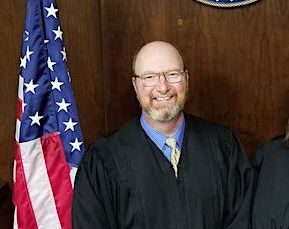
The panel investigating ethical misconduct complaints against Habersham County Chief Magistrate Gerald Johnson recommends that he be removed from office.
In its report to the Georgia Supreme Court, the Judicial Qualifications Commission (JQC) Hearing Panel rebuked Johnson for his actions related to a domestic dispute at his home on October 18, 2021. During that incident, Johnson broke his wife’s car window, repeatedly fired an AR-15 into their backyard while drunk, and briefly aimed the firearm at a law enforcement officer. The panel said the Habersham County Sheriff’s Office gave the now-suspended judge “preferential treatment” by not arresting and charging him.
The panel also addressed a complaint JQC filed, then later withdrew, that Johnson attempted to use the prestige of his office for his own interests when he asked the investigating deputy to turn off his recording device.
“The reason for doing this, of course, was to keep from the public’s eye the nature and extent of his misconduct so that Johnson could maintain his job as Chief Magistrate without censure, official or otherwise,” the panel wrote in its 14-page report.
Code of Conduct
The panel agreed with JQC Director Chuck Boring that Johnson violated the Judicial Code of Conduct. Johnson’s actions, and those of the sheriff’s office, would cast doubt over his “integrity and impartiality” if Johnson were allowed to return to the bench, the panel said.
The state supreme court suspended Johnson soon after the incident, pending the outcome of JQC’s investigation. Nearly 13 months into his suspension, on November 16, 2022, Johnson testified before the Hearing Panel and expressed hope they would reinstate him.
“I’d love to go back to work,” he said. “I love my job, and I love serving the people.”
The panel was not swayed, stating in its report, “…he seems sincere in his desire to continue to serve his community in a meaningful way. However, the Hearing Panel does not believe it is appropriate for that societal contribution to include serving as a judge: the Panel’s unanimous recommendation is removal from office”
Recovery but no leniency
Johnson and his legal team were unable to persuade the panel toward leniency. Clinical psychologist Robert Obst of Sandy Springs testified at the hearing that Johnson’s thinking was “compromised” by alcohol and depression the night of the incident. He said Johnson has made remarkable progress since entering treatment for alcohol abuse.
Johnson’s attorney, Dennis Cathey of Cornelia, suggested his client be given an additional six-month suspension without pay and then be allowed to return to the bench. The three-person panel of Fulton County Superior Court Judge Robert McBurney, former Dekalb County Judge Dax Lopez, and Atlanta attorney Richard Hyde clearly stated they did not see that as an option.
In reaching that conclusion, the panel relied on testimony, field interviews, and evidence Boring presented at the hearing. The evidence included dashcam video and body audio from Habersham County Sheriff’s Lt. Travis Jarrell. It was Jarrell who Johnson pointed his gun at, sending the veteran law enforcement officer running for cover.
While Johnson denied intentionally aiming the gun at deputy Jarrell, he said he knew that he scared him.
“What I remember is watching Travis run back down the sidewalk toward the driveway, and it occurred to me I had frightened him,” Johnson testified. “I did not have any idea I had pointed a gun at anyone until the sheriff came to talk to me several days later, and he told me that I did.”
“I would never hurt law enforcement,” added Johnson, who served 25 years in law enforcement before becoming a judge.
The panel said Lt. Jarrell’s tone and demeanor on the tapes “were consistent with someone who had previously encountered Johnson in a drunken state: there was no surprise in his voice; there was instead an understanding and almost resigned tone to his speech.”
While his deputies did not arrest Johnson, Sheriff Joey Terrell did refer the matter to the Judicial Qualifications Commission.
A ‘trigger-pull away’
The panel said Johnson displayed “decidedly unsound character” in his handling and firing of the rifle on the night in questions “all while admittedly drunk and distraught.”
They said he endangered multiple lives.
“Everyone involved (especially Lt. Jarrell) is lucky that Judge Johnson did not again fire his assault rifle when he had it trained on his friend and former colleague, as death was but a trigger-pull away.”
The panel also determined Johnson violated multiple laws, and the fact he was not arrested further compromised his role as a jurist.
“… criminal defendants appearing before Johnson would see not a fair and impartial jurist but instead ‘that judge’ who, despite having repeatedly fired his assault rifle in the neighborhood, scared his wife such that she fled to her car, then smashed her windshield, and ultimately pointed his loaded and freshly fired rifle at a deputy — all while drunk — wasn’t shot, roughed up, arrested, handcuffed, cited, or even given a talking to. Instead, he got a free ride to his mother’s house. Twice. And a fully paid vacation from work for over a year.
The likelihood that any private citizen in Habersham County would enjoy the same outcome after having committed the same series of acts is vanishingly slim,” the panel concluded.
“The bottom line is that Judge Johnson, due to his status, received preferential treatment — and because he did, the public’s confidence in Judge Johnson’s rulings on criminal matters is too likely irretrievably broken.”
Time and cost
The JQC Hearing Panel submitted its report and recommendation to the Georgia Supreme Court on Friday. It’s unclear when the court will issue a decision. In the meantime, Johnson remains suspended with pay.
Since his suspension on October 29, 2021, Habersham County has paid Judge Johnson over $105,000 in salary and phone allowances. Last March, the county hired local attorney Winslow “Wink” Verdery to assist magistrate Amy Thomas with the extra workload she inherited due to Johnson’s absence.







